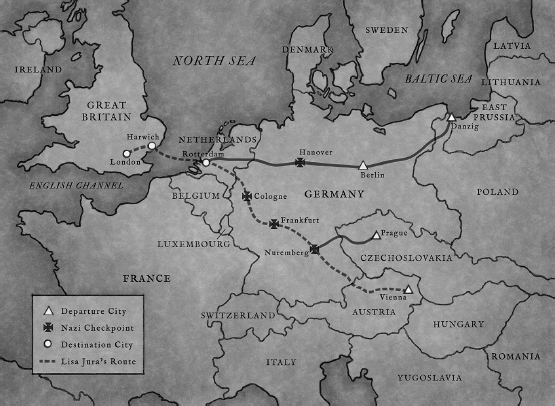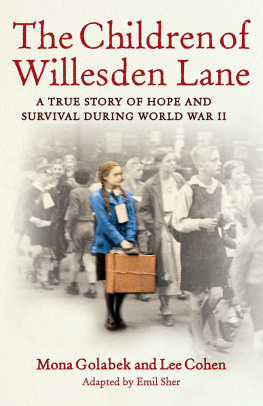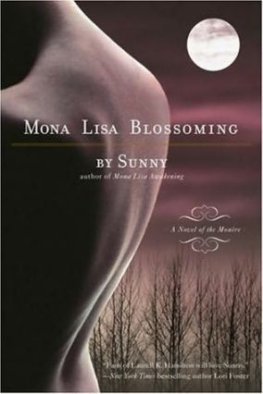
This edition published by Allen & Unwin in 2017
First published in the United States by Little, Brown and Company, a division of Hachette Book Group, Inc.
The Children of Willesden Lane: Young Readers Edition was adapted for young readers by Emil Sher. It is an abridgment of The Children of Willesden Lane by Mona Golabek and Lee Cohen, published by Grand Central Publishing.
Copyright Text, Mona Golabek 2017
Copyright Discussion Guide, Mona Golabek and Hachette Book Group 2017
All rights reserved. No part of this book may be reproduced or transmitted in any form or by any means, electronic or mechanical, including photocopying, recording or by any information storage and retrieval system, without prior permission in writing from the publisher. The Australian Copyright Act 1968 (the Act) allows a maximum of one chapter or ten per cent of this book, whichever is the greater, to be photocopied by any educational institution for its educational purposes provided that the educational institution (or body that administers it) has given a remuneration notice to the Copyright Agency (Australia) under the Act.
Allen & Unwin
83 Alexander Street
Crows Nest NSW 2065
Australia
Phone: (61 2) 8425 0100
Email:
Web: www.allenandunwin.com
A Cataloguing-in-Publication entry is available from the National Library of Australia
www.trove.nla.gov.au
ISBN 978 1 76063 080 5
eISBN 978 1 76063 912 9
For teaching resources, explore www.allenandunwin.com/resources/for-teachers
Cover and text design used with the permission of Hachette Book Group
Cover photo by dpa picture alliance / Alamy Stock Photo
Text and cover adaptation by Joanna Hunt
Internal photographs courtesy of Mona Golabek
This book is dedicated to young readers everywhere. May Lisa Juras story inspire you to find the music within your heart and the dream you wish to follow.

MY MOTHER, LISA JURA, WAS MY best friend and my teacher. She taught me and my sister, Rene, to play the piano. But those lessons were more than just piano lessons; they were lessons in life. She would always say to me, Mona, each piece of music tells a story.
And in those piano lessons, she told me the story of her life.
I was just a little girlpracticing the piano and listening to her tell me about mysterious friends in her childhood and a train ride she took when she was fourteen years old to escape the terrible things that were happening in her hometown of Vienna. She told how her music gave her the strength to face so many hard times and an uncertain future.
So one day, I decided to write her story. Together with my coauthor, Lee Cohen, I wanted to share that story with all of you. I thought I could inspire readers with a very important message: What do you hold on to in life when facing great challenges?
Since the original publication of the book, the response from young readers has been overwhelming and often profound. We connect with Lisa and the violence she faced, a high school student from Chicago wrote. But the student added that he was inspired by my mothers courage and perseverance. If Lisa can do it, he added, I can do it.
During a school visit in California, one student told me, I dont know yet what I want to do with my life, but this book has helped me decide what kind of person I want to be.
Like my mother, the hero of this book, I hope you discover the courage and direction to be a hero in your own journey and that Lisas story may help you decide what kind of person you want to be. Know that, despite lifes greatest challenges, you can do it, too.
MONA GOLABEK
London, October 2016

CONTENTS
AS SHE HAD DONE EVERY SUNDAY since her tenth birthday, fourteen-year-old Lisa Jura boarded the lumbering streetcar in the heart of the Jewish section of Vienna and crossed the city, heading for Professor Isseless studio.
She loved the ride.
To go across Vienna was to enter another centurythe era of grand palaces and stately ballrooms. As the streetcar passed Symphony Hall, Lisa closed her eyes, just as she had many times before, and imagined herself sitting perfectly still in front of the grand piano on the stage of the great auditorium. She could hear the opening of Griegs heroic piano concerto. She straightened her back into the elegant posture her mother had taught her, and when the tension was almost unbearable, she took a breath and began to play.
When she finally opened her eyes, the car was passing the Ringstrasse, the majestic tree-lined boulevard where the Grand Court Opera House stood. This was the Vienna of Mozart, Beethoven, Schubert, Mahler, and Strauss, the greatest composers of all time. Lisas mother had filled her head with their stories, and she had made a secret vow to live up to their legacy.
In a booming voice, the driver called out her stop. But today his words were strange and different: Meistersinger-Strasse. Lisas heart skipped a beat. Why hadnt the driver said Mahler-Strasse?
As she climbed down into the great plaza, she saw all the street signs had been changed; the Nazis did not approve of such a grand avenue being named after a Jew. She felt her fury grow but forced herself to think about the lesson ahead, knowing that once she was at the piano, the world outside would disappear.
When Lisa reached her destination, she stopped short. A German soldier, tall and emotionless, stood in the doorway of the professors old stone building.
She had been coming to the professors studio for nearly four years, but this was the first time anyone had been standing guard.
He asked coldly, What business do you have here?
I have a piano lesson, she replied, trying not to be frightened by the black rifle he held against his gray uniform. The professor will be waiting.
The soldier looked up to the second-floor window. A figure stared down, then motioned that it was all right for the girl to come up. The soldier grudgingly allowed Lisa to pass.

Come in, Miss Jura, Professor Isseles said, greeting Lisa with his customary warm handshake. She breathed in the aroma of the white-haired professors pipe tobacco. For the next hour, she could turn away from all else and be a part of the music she loved.
As usual, there was little small talk. Lisa put the score of Beethovens Moonlight Sonata on the music stand, sat on the worn piano bench, and began to play. The professor sat forward in his chair and followed her progress with his copy of the score.
For most of the hour Lisa played uninterrupted, as the old man sat in silence. She hoped to catch him smiling. After all, she had learned the complicated first movement in only a week and had often heard him say that she was his best student.
Finally, he put down his music and just listened. She looked over and saw a distressed expression on his face. Was she playing that badly?
At the end of the piece, the professor made no comment. He looked at her for a long moment, then finally spoke, looking uncomfortable and ashamed: I am sorry, Miss Jura. But I am required to tell you that I cannot continue to teach you.
Next page













